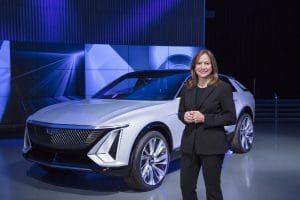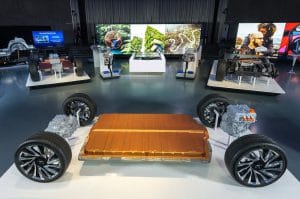
GM Chairman and CEO Mary Barra recently tactfully answered an analyst’s question about renaming the company to squeeze some value out of its EV plans.
General Motors will launch “20 or more” battery-electric vehicles worldwide by 2023, and 40% of the new models it’s aiming at the Chinese market going forward will be BEVs. By various estimates, that could substantially increase the value of an automaker that has long been struggling to get Wall Street to take it seriously.
A new estimate Morgan Stanley suggests the electric side of GM’s business could be worth $20 billion, while Deutsche Bank is putting the figure at as much as $100 billion, or nearly 2.5 times the company’s current market capitalization.
During a recent earnings call, GM CEO Mary Barra didn’t rule out the possibility of renaming the automaker to reflect its increasing dependence on battery-electric cars. But there’s growing interest, even pressure, from Wall Street to spin off the electric vehicle operations.
(GM plans to charge up China sales with EVs.)
Investors have taken a dim interest in conventional automakers in recent years, even as they’ve fallen in love with startups focused on electrification. Tesla’s stock price was nudging $1,900 a share late Wednesday, its market cap hovering around $350 billion, ahead of its 5-for-1 stock split coming Aug. 31.

GM China President Julian Blissett said the company’s plans call for 40% of new vehicles in China during the next five years to be battery-electric vehicles.
Meanwhile, an assortment of EV startups have gone – or soon hope to go – public using a creative approach called special purpose acquisition company, or SPAC. Also referred to as “blank check companies,” they helped Nikola Corp., a Phoenix-based hydrogen and EV company list itself earlier this year, its own market value now more than $16 billion, or roughly two-thirds of Ford Motor Co. Nikola is still at least a year away from launching its first product. Fisker and Canoo are two other EV startups hoping to raise gobs of cash through the SPAC approach.
GM wouldn’t have to go that route, but spinning off its high-tech operations – which also could include the autonomous vehicle unit Cruise – is one approach that “could unlock a massive amount of value,” Deutsche Bank analyst Emmanuel Rosner said during an appearance on CNBC.
Rosner isn’t the only one thinking that’s a good idea. Adam Jonas, the well-regarded auto analyst at Morgan Stanley, issued an advisory suggesting a spinoff could help both GM’s traditional business and its high-tech lines.
“The autonomy between the two units can liberate each other of various impediments to efficient capital allocation and talent development,” Jonas wrote.

General Motors’ all-new modular platform and battery system, Ultium, is critical to the long-term success of the company’s electrification efforts.
GM CEO Barra may have encouraged such speculation during her earnings call where she responded to an analyst’s question about possibly changing the company’s name to reflect its increasing focus on electric vehicles.
(GM wants Wall Street’s love, but can it deliver on its EV plans?)
“We are evaluating and always evaluate many different scenarios, so I don’t have anything further to say other than, we are open to looking at and evaluate anything that we think is going to drive long-term shareholder value,” Barra responded. “So, I would say nothing is off the table.”
Barra isn’t the only one looking at such options. When it was announced that former GM President Dan Ammann was moving to become the CEO of Cruise in November 2018, the New Zealand-born executive told TheDetroitBureau.com that the autonomous vehicle subsidiary could become more valuable than GM’s auto operations at some point. He agreed with speculation that GM might then need to consider a spin off or simply rename itself Cruise to reflect its increasing high-tech focus.
The idea of splitting off old-style manufacturing and new, high-tech operations played out at Delphi, the one-time GM parts operation which broke itself into two separate companies several years ago.

The new Cadillac Lyriq, the luxury brand’s first EV, made its debut recently. It’s also part of the company’s plans for China as well.
There are some reasons to dismiss the idea of a split between GM’s traditional and high-tech operations, however. And Barra may have made that clear as she has said repeatedly that GM is “on a path to an all-electric future.
For one thing, that has led it to pare back research and development efforts focused on conventional internal combustion engines. And for good reasons, if one believes that the industry is moving steadily closer and closer to the day when all passenger vehicles will run on batteries or, perhaps, hydrogen fuel-cells. If so, the “old” GM would face diminishing sales opportunities.
And, even then, it would still need to increase its reliance on hybrid and electric propulsion just to meet ever more stringent government emissions and fuel economy regulations in the U.S., China and other parts of the world.
(Could General Motors change its name? Barra doesn’t say no.)
For his part, Don Bilson, the auto analyst with Gordon Haskett Research Advisors, is skeptical any spin off is in the works. In his own research note, Bilson pointed to last week’s surprise departure by GM Chief Financial Officer Dhivya Suryadevara, who went to work for a new, high-tech start-up. If she had the opportunity to stay with GM or, more importantly, move over to an EV spinoff, suggested Bilson, he doubts Suryadevara would have left the automaker.

we request to have the Assembling plant in South Africa